In January 2020, companies affiliated with the Philippine Alliance for Recycling and Materials Sustainability (PARMS) joined the “Zero Waste to Nature: Ambisyon 2030” (ZWTN 2030). In doing so, they pledged to observe more sustainable ways so that, at the turn of the decade, they can truly achieve the vision of a zero waste Philippines.
Ambisyon 2030 urges institutions to strengthen existing initiatives and churn out innovative ones, leading the Philippines to a future where circularity and sustainability are the norm.
Going green for people and planet, Monde Nissin champions food security
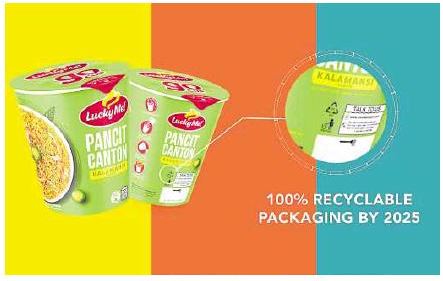
If you have an enduring love for snacks like Monde Special Mamon, Breadstix and Eggnog, you may have noticed the recent changes to their packaging when you went out to buy fresh stocks. Those revamps represent far more than a branding revolution and, in fact, reflect Monde Nissin’s passionate commitment to its sustainability goals.
Acknowledging the growing awareness of environmental degradation and continuously working sustainable ways into its systems, Monde Nissin signed the Ambisyon 2030 agreement. With that, it signified its tireless commitment to contribute solutions to the widespread waste management problem in the nation, all in the name of the well-being of both people and the planet.
Those packaging adjustments on iconic products like Monde Special Mamon, Breadstix and Eggnog did not change a thing about their cherished flavors but reduced unnecessary plastic trays and optimized the size and thickness of the plastic used.
That accomplishment is only one of many that the company fulfilled in a past year that it described as “a very remarkable year for making eco-efficiency possible.” Besides immense savings in plastic, Monde Nissin also got (1) up to 94-percent recyclable packaging material volume across majority of its portfolio, (2) a 20-percent reduction in waste disposed in landfills compared to the previous year, and (3) made strides to lower greenhouse gas (GHG) emissions and transition to a low-carbon value chain.
Its Quorn product line also contributed to attain sustainability goals. As a meat alternative, it works into a sustainable nutrition framework and, on a larger scale, contributes to lower carbon and GHG emissions. In 2019, Quorn obtained a Carbon Trust accreditation and is now the first global meat alternatives company to have the carbon footprint of products accredited by a third party.
As Monde Nissin partakes in ZWTN 2030, consumers and observers can be sure that goals in sustainability will not be unique to 2021 and will in fact endure. The company is gunning for a shift to 100-percent recyclable packaging and a 50-percent reduction in GHG intensity of manufacturing operations by 2025 as it opts for renewable energy sources, reduces the use of palm oil and achieves a ZWTN scenario in its plants by 2030.
Monde Nissin’s sustainability strategies and targets also go beyond waste management and reduced emissions. For instance, Quorn is just one of many products marking the company’s pivot to a healthier and better portfolio by 2030. Within the same timeline, it also hopes to empower smallscale distribution partners with livelihood opportunities and financial credit; employ a diverse workforce enjoying full and fair conditions; and ensure that sustainability is part of corporate life and culture.
The company wants to participate in the advocacy for food security, working toward better food accessibility, inclusivity and collective action along with eco-efficiency. It continuously enhances its products, educates consumers, and partners with other stakeholders intending to address both food security and malnutrition.
Monde Nissin is building a future of food with planet, health and taste uncompromised using the same innovation and passion that has driven the company for decades.
Colgate-Palmolive’s eco-friendly products and partnerships symbolize passion for a future to smile about

You must already be familiar with the Colgate Bamboo Toothbrush, the first eco-friendly toothbrush by Colgate made with biodegradable and compostable handles, and packed using recyclable cardboard. This easily stands out on the grocery store racks because of its unique make.
That is just one of many examples proving that Colgate-Palmolive Philippines (CPPI) is not new—and is resolute—in reimagining its products for a more sustainable, more responsible future. Aside from the toothbrush, CPPI also boasts of sachets of Palmolive Shampoo and Palmolive Soap, which have now transitioned to recycle-ready monomaterials.
For the Palmolive Soap that comes in a box, meanwhile, the packaging is made up of 90-percent recycled paper, nonlaminated so that the material could more conveniently be reprocessed later. Lest we forget, CPPI revealed in early 2021 the first-ever recyclable tube in its portfolio with the launch of Colgate Naturals Toothpaste. The featured packaging material resulted from five years of research.
This string of remarkable innovations is grounded in Colgate-Palmolive’s sustainability and social impact mission, a commitment to use 100-percent recyclable, reusable or compostable packaging across all the company’s product categories by 2025, among other goals. Globally, working with this ideal in mind, Colgate-Palmolive now has 26 true zero-waste-certified facilities in 16 countries.
The sustainability and social impact mission emanates from Colgate-Palmolive’s core belief that everyone deserves a future to smile about—a future in which the brand uses its being “in more homes than any other” for positive impact like improving people’s well-being, helping millions of homes with more sustainable products and healthier habits, and preserving the environment with climate action and decreased environmental footprint.
The innovations of CPPI show how the company’s local presence shares in the global agenda, and how it is grounded in the realities of a country facing the negative impacts of the climate crisis and a huge waste problem. Nothing drives that point home more than CPPI’s decision to participate in Ambisyon 2030.
Beyond investing in product development, CPPI also implements programs focused on partnerships with other stakeholders and the empowerment of communities. For example, it launched its Plastic Waste Collection program, with a vision of recovering plastic waste equivalent to the amount it puts into the market. CPPI even established in five SM Malls drop-off points where people could leave their plastic waste with an assurance that these would be disposed in environmentally sound ways.
In 2021, the company collaborated with Green Antz to turn tons of plastic waste into ecobricks that would later build 20 wash-and-brush stations in schools and municipalities all over Bulacan. With Plastic Credit Exchange, CPPI has supported the Aling Tindera program, a waste-to-cash collection scheme that engages and empowers sari-sari store owners through incentivization. CPPI is open to partnerships in and outside Metro Manila to further a noble cause and inspire new sustainable behavior.
The company has clarion commitments to find alternative, circular solutions to achieve a future where the ideals of ZWTN 2030 are a reality.
Capital’s ‘sari-sari’ store owners, cyclists win big with PT Mayora’s sustainable policies
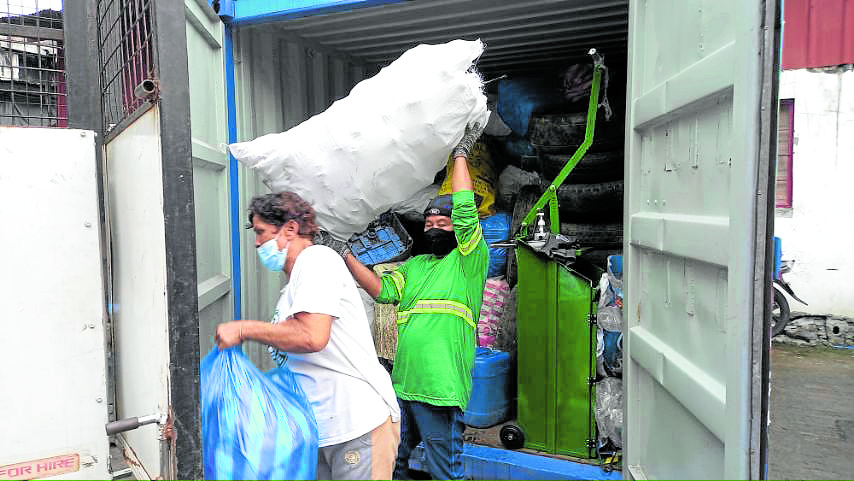
Collaboration works wonders. That is what the PT Mayora Indah Group (Mayora Group) has proven in partnering with some waste management companies to bolster the country’s efforts in managing its plastic waste and delivering impactful solutions to society.
Centered on proper plastic waste collection, processing and recycling, the Mayora Group entered joint endeavors with Plastic Credit Exchange (PCX) and Green Antz that introduced to Metro Manila interactive avenues improving garbage collection systems and plastic recycling projects. Now, the projects are benefiting sari-sari store owners and commuters in the capital.
The Mayora Group partnered with Green Antz, a leading green technology company, to shred plastic waste and upcycle them into bollards that could help manage the flow of pedestrians in Pasay City.
The partnership produced 800 laminated bollards from shredded plastic. These were later donated to the City of Pasay through the management of the Light Rail Transit, Line 1. Once-discarded materials are now fixtures that guide commuters and bicycle riders as they traverse roads surrounding the improved train stations, protecting them from potentially life-threatening hazards.
With its other partner, PCX, the Mayora Group supported the Aling Tindera program. In this partnership, the two enlisted the help of women sari-sari store owners in the collection of trash from their localities. The retrieved waste would then be placed in refurbished container vans, which act as hubs and storage units. For their work, the participants were compensated with cash.
The initiative gave residents of Brgy. 651, District 5, Port Area, in the City of Manila, access to an income-generating waste management system. This also empowered local sari-sari store owners economically, and built a strong network of sustainability-focused women entrepreneurs and community leaders.
Since its establishment in 2019, PCX has diverted about 20 million kilograms of plastic waste from the oceans through extensive partnerships with institutions in the private and public sectors. With Aling Tindera, the Mayora Group and PCX provided profound growth to the beneficiaries, their families and their communities.
Green Antz is no newbie in the business of sustainability, too. With over 30 Eco Hubs for plastic recycling across the country, Green Antz provides innovative solutions to transform plastic waste into eco-friendly building materials that meet the sustainability demands of the market, industry and communities in the country. It has been involved in joint undertakings with corporate powerhouses like Ayala Land, Ayala Malls and Shell Foundation to upcycle plastic waste and contribute to eco-friendly and societally beneficial interventions—such as housing solutions—in various places.
Both projects were ingeniously designed to address the waste problem and improve society in various ways. With the help of PCX and Green Antz, the Mayora Group equipped communities with the right resources not only to promote sustainability, but also to create livelihood opportunities and upgrade local road safety protocols.
At the end of the day, the Mayora Group, through its collaborative efforts toward sustainability, facilitated the economic recovery of Filipinos from the pandemic and, in the long term, empowered citizens to aspire for a higher quality of life.
URC generates power from solar energy in climate-friendly efforts
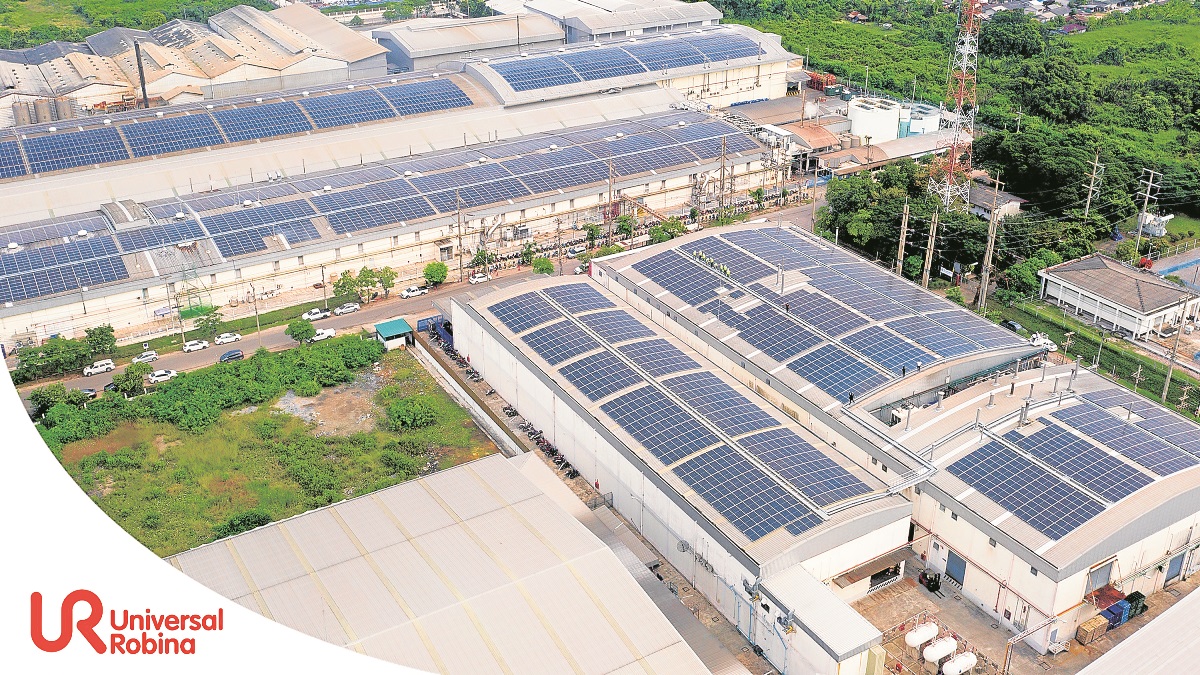
As the company marches into the future with greater concern for sustainability, Universal Robina Corp. (URC) has begun to adopt greener technologies. Foremost among its initiatives is the introduction of solar panels across its industrial locations here and abroad.
A proud exemplar of URC’s energetic push is its Thailand subsidiary, a recipient of 3Rs, 3Rs+ and Zero Waste Achievement Awards recognizing its efficient waste management systems. If you head over to the company’s compound in Samut Sakhon province, southwest of Bangkok, you will find the roofs of the six factories and four warehouses covered with solar panels.
That hardware harnessing energy from the sun can generate approximately 6 megawatts of clean power, decreasing the amount URC Thailand needs to source from the local power grid. It also ensures that the company lessens its dependence on fossil fuels.
URC Thailand general manager Tanant Suwanraks noted that URC Thailand has lined up more projects dovetailed with the company’s goal to help mitigate the devastating impacts of climate change: “We will not stop with the solar panels. We believe that the main core for businesses to carry on is to be responsible to the people, community, society, environment and our planet.”
URC Thailand began putting solar panels on its facilities in September 2019 under its “URGreen with Thailand’s Solar Panel Rooftop” project. This switch to more eco-friendly options is happening all over the Southeast Asian region for URC.
In the Philippines, the company has partnered with cement plants in efforts to convert waste into refuse-derived fuel. URC has also been installing solar panels at its manufacturing facilities. It can harness up to 1 MW at its plant in Canlubang, Laguna, and some 21 kilowatts
at its Vitasoy facility in San Fernando, Pampanga. As one of the largest food and beverage manufacturing companies in the Philippines, its sustainability commitments—including its signing of the ZWTN 2030—can impact various industries.
The company’s Vietnam subsidiary has an ongoing installation of a 3-MW solar rooftop system in its coffee plant located in Vietnam Singapore Industrial Park in Binh Duong province. The solar panels will cover 18,500 square meters of roof area, which can potentially supply 21 percent of the actual consumption of the plant while providing thermal insulation that could reduce temperatures by around 4 to 5 degrees Celsius.
The Binh Duong project is just one of URC Vietnam’s sustainability initiatives encompassing greater consumption of renewable energy, reduction of water and energy usage, and recycling activities, among others. Plans for other factories in Vietnam are in the works.
URC chief sustainability officer David Lim said that the projects across the region, where the company’s presence has been increasing, are anchored in one of URC’s core strategies: building a peopleand planet-friendly culture.
“We aim for a low-carbon economy by optimizing the use the of renewable energy,” he said. “URC is gearing toward net zero by 2050.”
URC takes a more holistic view of its sustainability roadmap. Aside from the efficient use of resources and investment in renewable energy, the company is also addressing its packaging footprint through using and developing recycle-ready materials.
With upcycled outdoor furniture, Mondelēz International shows value of recycling plastic
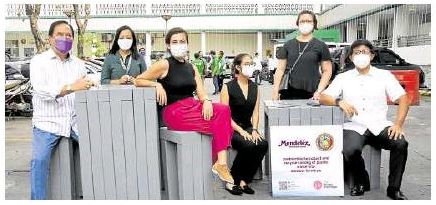
If you happen to visit Parañaque City, be on the lookout for plastic picnic benches, bike racks, waste cubes and dining sets on some of their community spaces. Those were once plastic waste, which could have ended up in landfills and waterways. Thanks to snacks company Mondelēz International, they serve better purposes.
“We recognize the responsibility that each one of us has in ensuring plastic waste does not end up in nature,” said Atty. Joseph Fabul, corporate and government affairs country manager for Mondelēz International in the Philippines. “For consumers, it could be buying in bulk rather than in small pieces if they can afford it, and making sure to dispose of their waste properly. For companies like ours, it means being mindful of our packaging use and supporting the collection of what we put out in the market.”
Taking this role seriously, Mondelēz International worked with The Plastic Flamingo, a social enterprise that collects and transforms plastic waste into construction materials like eco-lumber, thus also providing livelihood to collectors and processors.
“In 2019, we started our journey [of learning] how we can support waste collection, launching a project to collect just 1,000 kilos of plastic waste [together] with the Plastic Flamingo the following year. By 2021, we have expanded this to 42,000 kilos … ,” Fabul recalled.
Opening the project to like-minded organizations last year, Mondelēz International ended up collecting and diverting plastic waste weighing 172,489 kilograms, as heavy as 86 automobiles. Part of that haul went to The Plastic Flamingo, which turned them into outdoor furniture.
The finished products were donated to the government of Parañaque, Mondelēz International’s home city, last Nov. 22.
The project was funded by the company’s global Sustainable Futures platform, which incubates, finances and builds initiatives creating a positive impact on people and the planet. Such a campaign is sure to exist for more years—and perhaps with a scaled up version—thanks to Mondelēz International’s commitment to
Ambisyon 2030.
Demonstrating the company’s persistence, it plans to surpass its 2021 yield this year. The furniture now enjoyed by Parañaque residents should be considered an indication that possibilities abound for recycled plastic. The Plastic Flamingo’s model highlights how plastic can be reused and repurposed.
Mondelēz International is also expressing its participation in ZWTN 2030 in several other ways. By 2030, the company plans to collect and divert plastic waste equal to the amount it uses in its packaging. It is also working to meet global goals, such as: reducing the amount of packaging used; making 100 percent of its packaging recycle-ready and labeled with recycling information; and decreasing by 25 percent its use of virgin plastic in rigid packaging, or getting a 5-percent reduction in virgin plastic in its overall packaging.
Mondelēz International is a company long dedicated to sustainability. The Philippine office is one with its parent company in ensuring net zero greenhouse gas (GHG) emissions in the entire value chain by 2050.
The company most recently pledged support for the Circulate Capital Ocean Fund as a limited partner. The fund supports scalable business solutions, thereby helping develop infrastructure to sustainably manage plastic waste in India and Southeast Asia.
Unilever to deliver packaging commitments, collection targets by 2025 thru global strategies, homegrown solutions
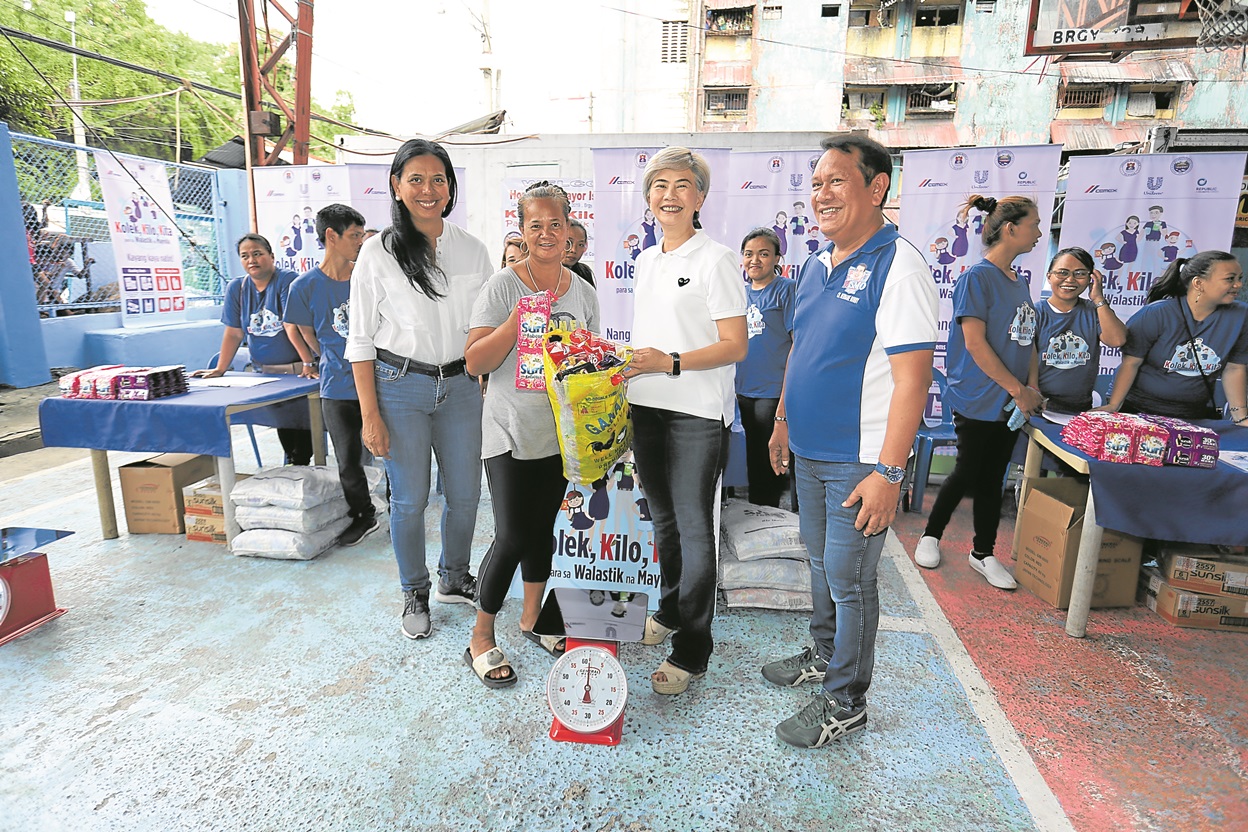
Plastic is a valuable material. It is crucial for the safe and efficient distribution of products, and it has a lower carbon footprint than many alternatives. The problem is, far too much of it ends up in the environment. In fact, it’s predicted that the plastic pollution crisis will surge between now and 2040 with twice as much virgin plastic created and four times more ending up in the ocean. We cannot let that happen.
But banning plastic altogether isn’t the answer. The solution lies in reducing the use of virgin plastic (or making as little as possible in the first place) while keeping all plastic produced in a circular economy (treating it as a resource rather than waste).
Unilever Philippines has been working to reduce plastic pollution through global goals launched in 2017 and 2019 focused on reducing virgin plastic and replacing this with recycled material; adopting recyclable, reusable and compostable packaging; and collecting more plastic than they sell. These goals should have already been achieved by 2025.
Predating all these commitments is the company’s long-standing Misis Walastik plastic collection program, which began in 2012 and is still going strong amid challenges from the pandemic.
The Misis Walastik program runs on a “Kolek, Kilo, Kita” framework. Here, participating households collect plastic waste like pouches, bags, wraps and sachets then segregate them, ready for pickup by roving ecoaides, colloquially known as the magkakariton. Plastic waste is matched with cash incentives by the kilogram. The waste is then sold to junkshops.
While the program had to take a pause in the early lockdowns, Unilever swiftly came up with a solution by tapping small neighborhood waste banks and collectors and creating pop-up junkshops in different areas within the community. This strategy lessened the risk of COVID-19 transmission and made the program more accessible to households while enhancing the livelihood of those in the waste collection business.
Misis Walastik has now engaged over 400 barangays, 100,000 households and countless individuals relying on the informal waste sector. Unilever has so far collected over 4,600 metric tons of flexible plastic waste that are mechanically recycled or coprocessed.
The program’s emphasis on proper incentivization for waste collection is complemented by consistent community education support, empowering communities and local governments, sweepers, junkshop recyclers and community leaders with knowledge and skills for greener attitudes and behaviors.
Aside from the plastic recovery program, Unilever also increased its use of recycled plastic. In the Philippines, products like Dove, Breeze, Domex, Comfort, Sunlight, Love Beauty and Planet, and Surf now use 100-percent recycled bottles. Under the Selecta brand, the flexible packaging is already 100-percent recycle-ready. Work is underway for other brands.
Unilever’s journey toward sustainable packaging is guided by its “Less-Better-No Plastic” approach. “Less plastic” means cutting back on plastic used. “Better plastic” is about making products recyclable and eliminating problematic materials. Finally, “no plastic” entails looking for alternative materials such as aluminum, glass, paper and board, and removing plastic where it is unnecessary.
P&G builds on strong track record, integrates sustainability in all of its operations

Procter & Gamble (P&G) focused on inteis sustainabiligrating ty measures across its operations as it embarks on Ambition 2030, building on an already strong track record in green innovations.
As the company champions responsible consumption, it plans to craft sustainable and meaningful interventions in four specific areas of operations: (1) brand innovations, (2) supply chain operations, (3) societal partnerships and (4) employee empowerment.
Consumers may already have encountered some of P&G’s innovations while shopping for groceries and other essentials. It eliminated virgin plastic overwrap on Safeguard multipacks, thus avoiding 8,500 kilometers of potential single-use plastic waste yearly (the length translates to walking along the Boracay shoreline 1,000 times). For the Herbal Essences bio:renew collection, the bottles now use postconsumer resin or recycled plastic material, further reducing use of virgin plastic.
A partnership making waves among communities is P&G and World Vision’s “PagAsa sa Basura.” The initiative recovered 3.2 million pieces of plastic sachets and hundreds of thousands of plastic bottles. These were upcycled into over 2,000 public school chairs, complete with safety dividers, which were then donated to various partner schools.
P&G also empowered its 2,000-plus employees to become advocates of sustainability in the workplace. The company has consistently promoted a culture of sustainability in everyday business by ensuring that sustainable innovations come first, backed by strong leadership and tone from the top.
All these steps build on P&G’s earlier achievements in the elimination of waste. The company ensures that sustainability is hardwired into its business strategy and not seen as separate work.
The company currently purchases 100-percent renewable electricity, enabling it to reduce its greenhouse gas emissions by 80 percent. Worldwide, 100 percent of its plants are certified “Zero Manufacturing Waste to Landfill,” including the P&G Cabuyao manufacturing plant in Laguna. This stamp means that a plant recovers, reuses and recycles wastewater and solid waste generated from operations. Furthermore, all the plastic waste undergoes extrusion for recycling while biodegradable wastes are composted and used as fertilizers.
By 2030, P&G’s global operations aim to make 100 percent of packaging recyclable or reusable and to cut the use of virgin plastic in its packaging by 50 percent.
Nestlé Philippines leads with groundbreaking initiatives to tackle plastic waste
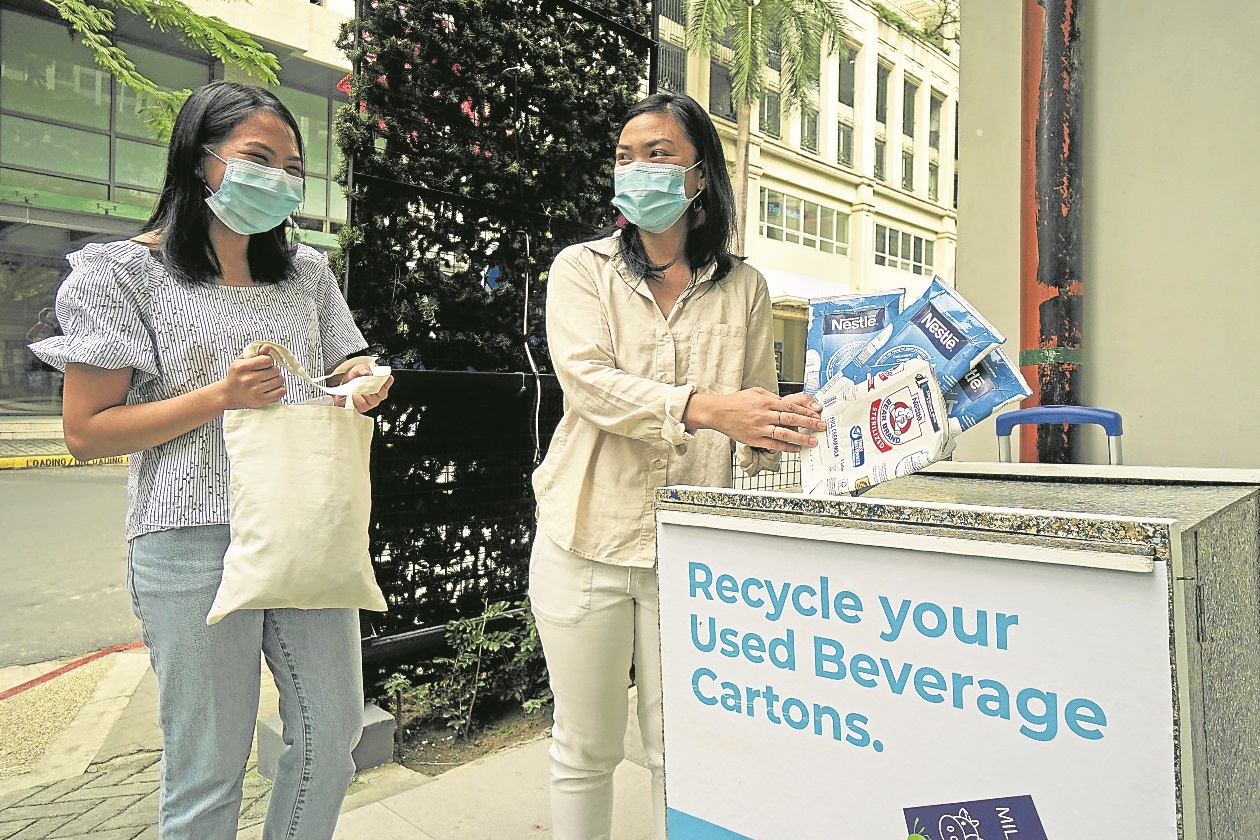
As the world’s largest food and beverage company, Nestlé is committed to taking a leadership role in tackling the complex and urgent problem of plastic waste.
Globally, the company aims to make its packaging, including plastics, 100-percent recyclable or reusable by 2025. Nestlé is taking a holistic approach to address plastic waste, accelerating its initiatives across three focus areas: (1) developing the packaging for the future, through packaging and delivery innovation and plastic reduction; (2) helping to shape a waste-free future through increased collection and recycling; and (3) driving new behaviors and understanding through solid waste management education.
Nestlé Philippines, as one of the country’s top fast-moving consumer goods (FMCG) corporations, has introduced groundbreaking initiatives to address plastic waste. In its most significant environmental milestone to date, the company has already achieved plastic neutrality as of August 2020, making it the country’s first and only multinational FMCG to do so.
This means that the company is recovering the equivalent amount of plastic packaging that it puts out in the market. With support from its partners, it was able to collect over 38 million kilos of plastic waste from August 2020 to December 2021.
Saluting the firm, Commissioner Crispian Lao of the National Solid Waste Management Commission (NSWMC) and founding president of PARMS said: “Nestlé has always been at the forefront of corporate stewardship and exemplifies what a responsible brand needs to be. It is always a pleasure and an honor to be part of your journey as your private sector representative to the NSWMC and with your support as part of the inception team that led to the formation of, and with your continuing active participation, PARMS’ ‘Zero Waste to Nature: Ambisyon 2030’ goals. In 2017, along with our partners, we discussed the concept of plastics neutrality. And now you have achieved this, well ahead of your global and local commitments.”
Other accomplishments of Nestlé Philippines under the three focus areas include:
- The country’s first food and beverage company to shift to paper straws. Nestlé Philippines is constantly searching for alternative materials to make its packaging more sustainable. An equally important milestone is its full transition to using paper straws in its locally manufactured ready-to-drink products;
- The country’s first citywide soft plastic waste collection project. In June 2019, Nestlé Philippines piloted May Balik! Sa Plastik!, which recovered postconsumer sachets, used beverage cartons and other soft plastics, in partnership with Valenzuela City. The project successfully put a tangible value to soft plastic waste, which previously had no worth;
- The country’s first solid waste management education modules rolled out in over 10,000 public schools nationwide. Information, education and communication on solid waste management are important in achieving the goal of a waste-free future. Nestlé Philippines developed these modules for its Nestlé Wellness Campus program. The modules are used by some 12 million Grades 1 to 10 students.






